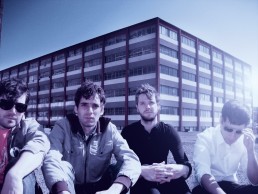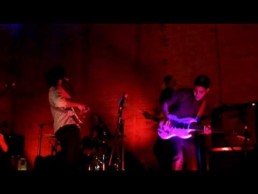Suuns are back and “It feels like a crazy slap in the face”
This was published on Village Underground's VUzine, which I edit. Although Ava Hapgood pulled together the final article, I'm very pleased with the format. The article is possibly the most Blowbackian format since Blowback.
Let’s set the scene: It’s four in the afternoon in London, eleven in the morning in Montreal. Dan is sat in a recycled Jubilee line tube train on top of Village Underground in Shoreditch, amid the sounds of computer keys and answering messages for the venue’s office. Around 3,243 miles away, Joe, guitarist, bassist and founding member of Suuns, can be found in his home just a few blocks from Montreal’s Breakglass Studios, where their second album, Images Du Futur, came into being.
Throughout the interview, life is condensed and pushed across the Atlantic - traffic grinds by as car horns congregate, children goad for attention and the phone buttons are accidentally pressed, the signal drops, echoes and distorts. These bursts disrupt the conversation like Suuns music: the drone and hum of technology of modern living with surprising sounds taking them in new directions. Breaking forms, reshuffling order.
Almost two years since their first show at VU, Suuns will return to Shoreditch this September with a new album for a new stage- an eigen pun that serves to highlight just how much has evolved for a band previously named after nothing.
D: Hi Joe- we thought we’d grab a little interview with you ahead of your performance at VU. Last time you played here was two years ago and you were on our smaller stage setup underneath the arches. This time you’ll be in the main space, a move which you must see happening a lot for the second album run of tours and gigging. Do you think playing to larger audiences affects the atmosphere on stage?

J: Yes I do remember that gig- and I think in general we are just a different band, so I think it will be a different show than it was almost two years ago. I think that will affect it more than the space but who knows I mean, it kinda seemed more like a warehouse vibe back then…
D: Yep it’s still very much got that vibe! Is there a danger as you become more popular that you lose that intimacy and response from a small audience? Do you think there’s a risk that something gets lost when you scale up?
J: I think that someone can always find a reason to claim it’s not as intimate- which is totally understandable- but I guess naturally it would happen if you were playing a bigger venue and by definition be less intimate. But we take that into consideration- all that’s changed really is the venue itself and that we’re a better band, so hopefully we can create an intimate space.
In what sounds like the outer edges of the conversation, rain begins to pound onto the roof of VU’s offices, reverberating off onto the EC2 pavement below and taking over the long-distance phone call at hand. Joe’s voice is almost totally obscured by the now very noisy, classic end-of British summertime fanfare.
D: Sorry about the rain interference by the way, we’re up on the roof, so when it rains we really hear it.
J: That’s awesome!
D: So I guess- [Shouting over the angry rain] - I guess a lot of people when they talk about your music focus on it sounding violent or aggressive- do you identify with that at all? Or is it more of a kind of raw energy?
J: I can see why people think that, but it’s definitely not where these things are coming from. It just happens that a lot of the time our songs end up that way, and it’s good, it makes the show a lot more intriguing and we don’t really have too many pop elements that are ‘happy’. I don’t really know how it happened - I know bands that use the same sort of set ups as us and it’s not at all the same so - a lot of it has to do with the vocals I’m sure- especially live- when we use a lot of harsh elements.
[Rain continues]
D: Yeah I think there is a visceral element- it’s that approach that hits home- it’s about the energy really rather than being outwardly aggressive or setting out to make ‘angry music’ as such.
J: It’s not like we’re trying to do any hardcore music- we’re definitely just trying to take it to a different place.
[The rain fades into the distance, Dan is able to hear himself speak again.]
D: Going back to your first album- what did you feel you’ve learnt from that and how did it affect your approach to Images Du Futur?
J: The first one was a very different record, we were completely independent, and we definitely made that record on our own time, a hundred per cent. The downside to that was we didn’t have much money or that much time to do it. We had been playing those songs for the better part of two years, and it’s kind of like we rushed in, played most of them live and then did a few overdubs. Luckily we had a few days to mix them, and that was it. We chose ten songs we thought would make a great album and then we got signed basically immediately and then started touring.
Images was really songs that were written in a short period of time in early 2012, and sound and cohesion-wise, the songs are a lot better, in respect that it sounds more like an album that came from a certain period. But that had its challenges as well- a lot of songs were not tested live, so we were just sort of working on them in the studio and we had no idea if they would really do well live before we started recording them. I hope it’s not a case where each record will be the magnetic opposite of the previous ones- but I don't think so.
[In the background now in Montreal, a child demands attention]
A child: DDDADDYYYY!
J: I think there’s a lot -
C: DADDY!
J: There’s a lot we’ve taken from -
C: DADD-
J: Sorry, hold on, my son’s here. Just go with Mommy for two minutes- [child is led/ carried away] he gets jealous that I’m in another room. Anyway. Back to that- there’s so much we’ve taken from both experiences that we can remember and apply for the next one- which is basically happening very soon.

D: You’ve named your album after the Images Du Futur exhibitions in Montreal, and you’ve all lived there for at least ten years- do you think the album in a way celebrates that legacy of Montreal?
J: There’s a definite lifestyle to this city and it’s especially good to musicians. It’s cheap to live here, everything is very close and compact- I walk five minutes to my studio and so does every other member of our band. Everything we kind of do is in some way an homage to this place just because it’s been such an influence on us- this band would not have started. It means we’ve been able to put a lot of work into the band because we don’t need to put a lot of work into surviving. It frees us up to be really devoted to do what we want to do, which is priceless, really.
D: Looking “to the future” now- do you view it as being essentially dystopic, is that the kind of future we’re going towards, or are we headed to a cleaner, brighter, better future?
J: Every time I think of the future it’s like a fake future to me. I always think of when I was six years old and I thought about the future and there’s those 80s movies where it’s always dark and smoke everywhere- but living in the age we live in, I don’t think [the future] is necessarily good but I don’t think it will be dystopic. If anything it will hopefully be positive. I gotta believe that.
D: In a way that’s why the Image Du Futur [formally an annual festival in Montreal] was so interesting, because it was about celebrating the possibilities of the future rather than thinking we’re all doomed.
J: Definitely. And it was a take on how we used to view the future- it’s like this retro view of the future, which is awesome. It’s great to see predictions come true, and what didn’t come true. So it’s kind of about realising that you make that happen, slowly. It sounds so cheesy and the name of the record can be so cheesy, but that’s exactly it. It can be exactly what you make of it.
Suuns are back at Village Undeground on 29th September supported by Grumbling Fur - last few remaining tickets here.
Village Underground Residency
As mentioned in previous blogs I've been doing a consultancy placement at Village Underground. I spent Monday and Tuesday in residence and two very different events were covered. On Monday we had a gig featuring TV On The Radio’s Kyp Malone Rain Machine project, with Marques Toliver in support. On Tuesday I was able to catch the ‘get in’ for Collaborative Dance Experience’s debut production Out Of Time.
I took with me 2 Kodak Zi8s and a Flip, my Dictaphone and an SLR camera. I was very happy with the material I shot. My first catch was Marques Toliver performing In The Cab. We were able to grab him between soundchecks and take him to the drivers cab of one of the tube trains on the roof. After his interview he performed an exclusive song. I shot this on all three cameras but put a quick rush on YouTube.
http://www.youtube.com/watch?v=6xJxgFuL2SQ
Village Underground’s Social Life
Following a meeting with Auro and Clément at the beginning of April, I managed to sort some dates to come down and cover activities at Village Underground. Before I came down it was important to have some social media networks more sorted.
Village Underground now has a Twitter Account, a YouTube channel, and a Flickr site. I’ve also been overhauling their Facebook and Myspace presence. At the simplest level this has meant using all the logos and backgrounds so branding is carried across all elements. It also means effectively pulling content from elsewhere and thinking about re-distribution.
What Village Underground can learn from the Barbican
For my MA Online Journalism I'm conducting a Production Lab placement with Village Underground, London. Following the last group Skype meeting, I thought it would be useful to do a case study on a venue that already has its online presence sorted. I managed to arrange a face to face meeting with Maryam Ashgari from the Barbican, a 28 minute edit of the meeting can be listened to below.
[audio: http://dandavies23.files.wordpress.com/2010/03/barbicanedit.mp3]But if you don't have half an hour to spare here are my conclusions.
Kate Tempest, flushed with success on a mission that is ongoing, obsessed
Originally published in the second edition of the VUzine. This was on the last page and I really think it helped tie the edition up. You can curse and call it typical You can welcome the inevitable But we missed the boat Our ship had sailed When Tempest stormed the critical. It’s been ten years in port But far from docked, she’s more than caught Attention She’s held court, spoke forth Waving, drowning, craving, storming, sailing. As long as they’ve listened, they’ve heard her As long as they came, she’d be there Jumping genre fences at festivals Being drunk on rhyme and rum, in bars and cafes Ranting late night in kebab takeaways The beat, her heart, her own, inaudible, invisible.
Go back Way back, before that Kate Tempest spat before she spoke Drummed out her words In school cloakrooms The rhythm of being in the womb Hip hop, the wet nurse Cries full of hunger and meaning Giving voice to the wounded, alone, stranded, abandoned. Writing plays for tomorrow and today Softening the life of the hard living Giving Whether whittling words or treading boards Stirring souls, portraying passion, long rounds of applause Crowds fired up, become molten and been forged into awards. So let the broadsheets bang on about background and beginning Before being shredded and forgotten. Let Jon Humphries get back round to pillaring politicians Rather than hastily constructing pedestals of jauntiness (and Jim Naughtiness) Let the bookies stop taking bets on fake measures of success. Because after the fawning journos, the fakers, After the flamers and slayers have taken their potshots After the Gogglebox gogglers and the blank switch off. Leave the musicians and the makers, Leave those who hear more with repeated listens Standing in the wings being lifted up with words Or pushing to the front Pinned against the band, The following, the follower, the fanzine and the fans. Tempest’s reply (sort of)
Kate Tempest played Village Underground on 11th November check out these amazing pictures of her performance taken by Abi Dainton


